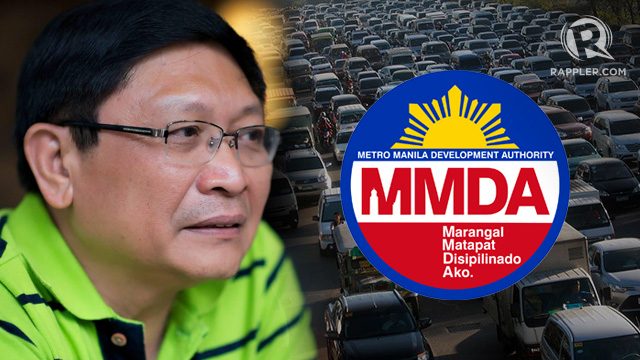SUMMARY
This is AI generated summarization, which may have errors. For context, always refer to the full article.

MANILA, Philippines — Metropolitan Manila Development Authority (MMDA) chairman Danilo “Danny” Lim has unveiled his plan to eradicate, hopefully, the traffic problem in the metro.
In an interview with reporters on Wednesday, June 7, he characterized his plan as employing a “back to basics” approach free of “fancy solutions”.
According to him, “there is no need to complicate” the problem which has been plaguing the capital region for years.
The long-standing problem has forced early morning rises, late-night arrivals home, and congested commutes for millions of Filipinos in and around the metro, costing the country billions in lost revenue and productivity every day. (INTERACTIVE: The commuter’s climate change calculator)
While Lim is new to the agency, having assumed office only last May 23, he stressed that he is not new in dealing with problems in government institutions, having been a retired brigadier general of the Armed Forces of the Philippines.
He will be focusing on 3 fundamental problems during his term: corruption, coherence, and continuity.
Fighting corruption
For Lim, corruption is the biggest root of the traffic problem. He said corrupt enforcers prevent effective control of traffic flow, while corrupt commuters who do not follow traffic regulations add to congestion woes.
He emphasized that the fight against corruption must start from within the agency.
“Ang ginagawa natin dito ngayon ay internal cleansing,” (What we are doing is an internal cleansing) Lim said. “We want to clean inside because that would show, we would deliver a message to the outside.”
He plans to eliminate corruption by heading the agency with rigor. He will not give second chances to erring MMDA enforcers, he said. He also said that those who engage in kotong or extortion will automatically be relieved.
He said that he has already talked to all enforcers and told them that he will not be forgiving.
But Lim also knows that he cannot only be hard on his new soldiers. Lim has since appealed to Congress for a P6,000 hazard pay for all enforcers, regardless if they are regular or contractual.
He also went to the Department of Budget Management to ask for a bigger budget for an increase in salary for all MMDA workers, and to increase the number of the agency’s enforcers.
With more than 1,000 road intersections in the metro, at least 7,000 enforcers are needed; however, the agency currently has only about 2,300, and a lot of them, Lim admitted, should not be enforcers as they have not been trained.
However, Lim said that low wages and an undermanned team is not an excuse for dishonesty in service.
Uniting traffic policies
His next strategy is to unite the different traffic policies of the 17 local government units (LGUs) in Metro Manila.
The MMDA has had a difficult time coordinating the traffic policies in the metro due to the LGUs having autonomy in enforcing rules within their respective territories, he said.
The different traffic schemes, regulations, and penalties for every city or town has been confused commuters.
The MMDA, Lim said, is restrained by the separate policies of the LGUs, which, he said, want to continue handling traffic within their terrotories with an eye on the revenues from collected penalties.
“Alam natin na local officials sila, independent sila, may kanya-kanya silang powers.
Pero kailangan talaga yung interlocking interests,” Lim said. (We know that they are local officials who are independent and autonomous. But we need to have interlocking interests.)
Lim expressed his support to the lawmakers who have filed two bills in the House of Representatives to increase the power of the MMDA and to supposedly “unite” the local government units in legislation.
As of posting, both bills are still under review by the House’s committee on Metro Manila Development. (READ: House bills seek to give MMDA more power over local governments)
Necessary continuation
When asked about what to do with the plans of the chairman in charge before his appointment, Lim only said “Patuloy lang ‘yan.” (They will continue)
Before Lim assumed office, now MMDA General Manager Tim Orbos was the officer in charge of the agency setting up two traffic schemes: the light truck ban and the no-window-hour policy.
The light truck ban prevents light trucks from major thoroughfares during rush hours (6-10 am, 5-10 pm) from Mondays to Saturdays, and the no window hour policy prevents vehicles covered by the number coding policy to travel from 7 am to 8 pm.
Both schemes are set to expire by July, but since they have helped in easing traffic, Lim said that he will extend them “as necessary.”
Aside from these policies, Orbos employed a multi-sectoral approach, giving importance to coordinating with private vehicle operators and other government departments related to traffic such as the Department of Transportation and the Department of Public Works and Highways. (WATCH: Rappler Talk: MMDA’s Orbos on Metro Manila’s traffic woes)
Lim then highlighted that Orbos remained in the MMDA to help him in transitioning from his retirement to heading the agency. He said that Orbos was pleased that their team was “finally complete”.
It is not certain whether being straightforward will solve a multi-faceted problem which has outlasted his predecessors, but Lim said his strategy is only derived from the orders of President Rodrigo Duterte, a leader no diffferent in his approach. – Rappler.com
Add a comment
How does this make you feel?
There are no comments yet. Add your comment to start the conversation.